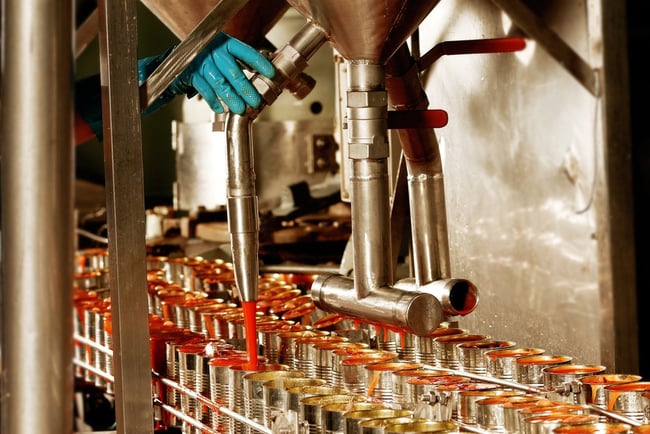When it comes to food manufacturing, it is important to take the steps necessary to avoid the cross-contamination of products. Unwanted allergens present in your products or manufacturing facilities can be dangerous for the millions of people that have food allergies. The top eight allergens in food production are soy, wheat, milk, peanuts, tree nuts, fish, and shellfish.

While there are strategies that can help reduce the risk of cross-contamination, it can be challenging to create an optimized production schedule that takes possible allergens and contamination into consideration.
There are multiple ways to prevent the cross-contamination of products within food manufacturing plants.
Strategies to Prevent Cross-Contamination in Food Manufacturing
1. Segregation and Separation
The best-case scenario for food manufacturers would be to process allergen-containing products in a separate facility altogether. However, this may only be possible for large companies that have the luxury of having multiple plants. Another challenge with this is that is can be challenging to coordinate the activities between the plants and have the visibility you need between the different production facilities.
An Advanced Planning and Scheduling (APS) software that can handle multi-plant scheduling can help coordinate the production across multiple plants. For example, a manufacturing order’s operations can be set to occur in different plants at once. This is useful for orders that contain both allergen ad non-allergen containing products. In addition, plants that share production or packaging resources can synchronize their schedules to ensure that the required resources are available.
Having different productions lines for different types of products can also help reduce the risk of contamination. However, in cases where production lines cannot be sufficiently separated, advanced sequencing and scheduling may be required.
2. Scheduling
This method involves the creation of a production schedule that will process compatible items at the same time on all of your production lines. For example, if you have multiple lines in the same room, then your could schedule the same types of allergens on all lines simultaneously.
In addition, scheduling items with the least amount of allergens first and ending with the foods that contain the highest amount of allergens can help further reduce the risk of contamination. This will limit the amount of cleaning required when switching from one product to another.
3. Sanitation
Another method to control cross-contamination is to implement cleaning procedures when switching from one item to another. PlanetTogether's APS system can be set up to automatically add setup time when changing from one type of product to another. These dynamic setup matrices can be used to automatically determine and schedule the time required for setup based on the attributes of the operations, such as ingredients used.
Advanced Planning and Scheduling (APS) Software
Advanced Planning and Scheduling Softwares have become a must for modern-day manufacturing operations as customer demand for increased product assortment, fast delivery, and downward cost pressures become prevalent. These systems help planners save time while providing greater agility in updating ever-changing priorities, production schedules, and inventory plans. APS Systems can be quickly integrated with an ERP/MRP software to fill the gaps where these systems lack planning and scheduling flexibility, accuracy, and efficiency.
With APS you can:
- Create optimized schedules that balance production efficiency and delivery performance
- Maximize throughput on bottleneck resources to increase revenue
- Synchronize supply with demand to reduce inventories
- Provide company-wide visibility to resource capacity
- Enable scenario data-driven decision making
The implementation of an Advanced Planning and Scheduling (APS) Software will take your manufacturing operations to the next level of production efficiency by taking advantage of the operational data you already possess in your ERP system. APS is a step in the right direction of efficiency and lean manufacturing production enhancement. Try out a free trial or demo!
Related Multi-Plant Video